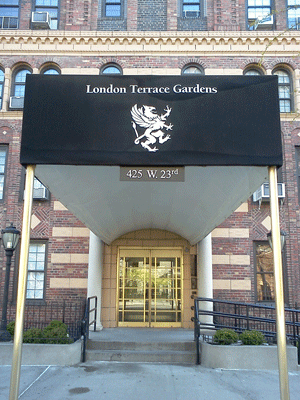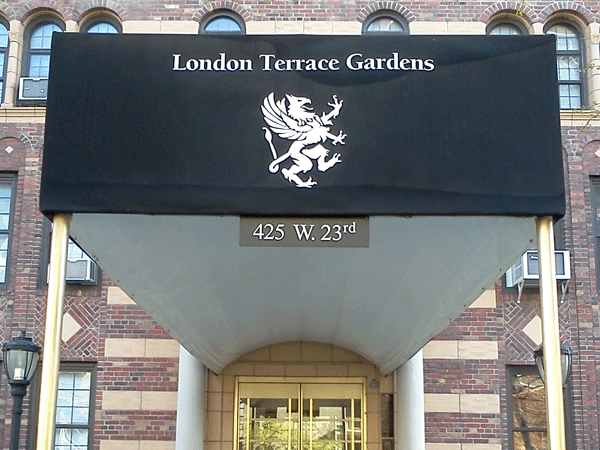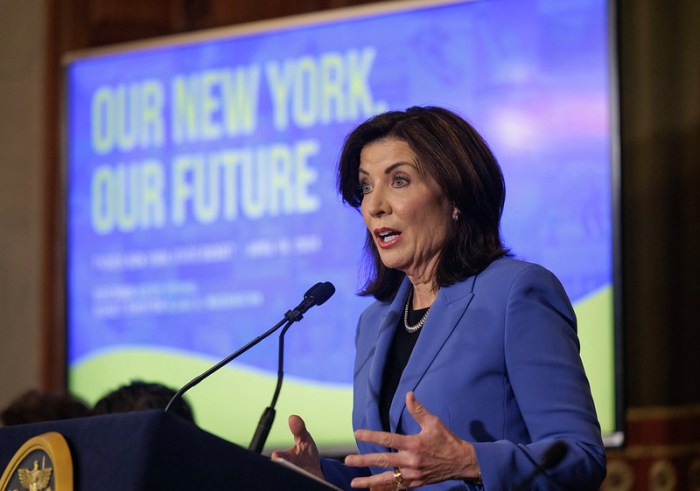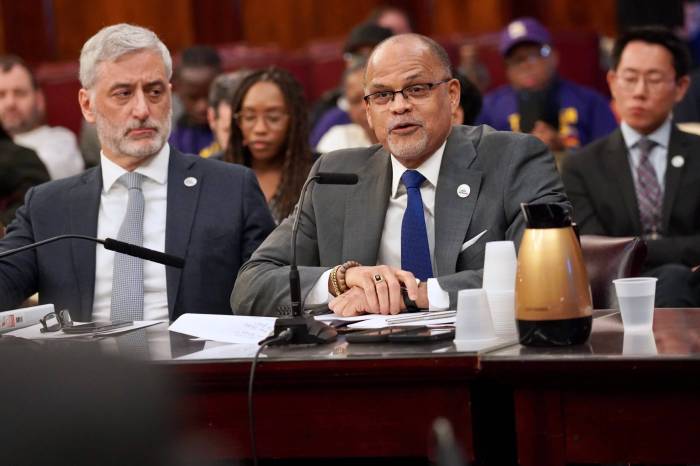 [/media-credit]
[/media-credit]
While the rent laws have withstood numerous court challenges over the years, the highly conservative court led by Chief Justice John Roberts has tenants all over New York nervous. The Supreme Court has already declared corporations to have the rights of people and may strike down the federal Affordable Health Care Act. But New York elected officials have yet to contemplate actions government could take to ameliorate the effects of an abrupt end to rent stabilization and rent control.
This article is not about the merits of the rent laws from a tenant or landlord perspective, but a look at what would happen if James D. Harmon, an Upper West Side landlord, gets the U.S. Supreme Court to take his challenge to the constitutionality of the laws. The lower courts have rejected Harmon’s case almost out of hand, given the long legal history of U.S. courts upholding the constitutionality of the rent laws — but tenants in regulated apartments are alarmed about what this right-wing court will do. All we know at the moment is that one anonymous justice asked for the city’s and state’s answers to Harmon’s appeal.
“It would remove the foundation of my existence,” said Melpo Caravolas, 78, of the potential loss of the rent-controlled apartment in Chelsea’s London Terrace where she has lived since 1964. She started out paying $164 a month, but contrary to the canard about older people paying next to nothing in rent, hers is going up to more than $1,800 this year.
“It’s not like I’m a freeloader,” Melpo said.
(Full disclosure: This reporter, too, has since 1987 lived in a London Terrace flat that is rent stabilized — as are the bulk of the 1 million rent-regulated apartments in New York — and has a rent hitting $1,800 this year, too.)
London Terrace is advertising a market-rate studio for $2,925 at the moment — and a three-bedroom penthouse for $18,000 a month. One-bedrooms are hovering in the $4,000 range.
While many tenants say they would have to leave if their rents rose to market levels, landlords maintain that market rents would decrease in the absence of regulation. But after the 2008 economic meltdown, market-rate tenants only got slight reductions from landlords, who bet that most of them would not take on the trouble and expense of moving.
In Massachusetts, Boston, Brookline and Cambridge all had rent protection until a statewide referendum overturned them in 1994. Six years later, The New York Times reported that “a survey by a leading landlord in Cambridge found that rents for his company’s formerly controlled apartments have doubled.”
“If rent stabilization were removed from my apartment, I would leave New York and go to work in another state,” said Liz Cook, 61, who has had a London Terrace studio for eight years. “I am a social worker and must travel to all the boroughs and must live in a central location.”
Cook and Caravalos were among the few Chelsea tenants willing to let their names be used for this article. One filmmaker in her 50s (who has been renting since 1978 in the West 20s) said, “I would most probably have to leave. I would find someplace where everything isn’t completely about money.”
Asked how the city would change in the absence of rent laws, she speculated, in an e-mail, “The true ruination of millions of lives aside, the exodus will continue. So, more goodbyes to anybody and anything a little risqué, outré; perhaps a little bit scruffy, messy, not so commercial; indie, edgy — that is interesting! Fun! — why so many flocked to Chelsea, NYC for years, decades. … So, more hellos to the homogenous, oft intolerant, monied hegemonic — that is, boring! Then Chelsea, NYC will be one big squeaky-clean suburban mall! If not such already.”
Dorothy Moulton, another London Terrace resident, noted, “I would have to leave. I’ve been here 35 years after thinking I would only be here for three.” A volunteer for the Metropolitan Museum of Art, she said, “I can’t imagine living anyplace but in New York — unless it is Paris.” But this “very conservative court” is making her contemplate alternatives.
Another anonymous retired 25-year resident said, “It would be devastating. Most of the middle class would have to move and the economy would suffer greatly,” noting the many rent-regulated tenants are the lifeblood of New York’s theaters, museums, concerts and bookstores. Where would he go? “Maybe Queens.”
A lot of the wealthy tenants who occupied rent-regulated apartments are gone from them due to decades of high-income deregulation. Up until last year, if your rent went above $2,000 a month and your total household income (including relations and roommates) was greater than $175,000 two years running, your apartment was automatically deregulated. (Those limits were raised by the state Legislature in 2011 to rents of $2,500 and income of $200,000.)
Not all middle-class tenants will have to leave New York, though those in Chelsea where the real estate market is so hot do not expect to be able to continue to afford it. One 73-year-old had the foresight to invest in an apartment elsewhere in Manhattan — where he would have to displace a tenant to move in himself.
“If I didn’t have that,” he said, “I could only think of moving in with my sister in Woodside.”
The city has all kinds of emergency plans for hurricanes and terrorist attacks — but not for the ending of rent regulations. Kate Ahlers, a spokesperson for the city’s Law Department, wrote that the question was “premature” since the Supreme Court is deciding now just on whether to hear the case.
“The parties will still have to brief the case and have oral arguments, and then the court will have to decide,” Ahlers noted.
Chelsea’s elected officials aren’t ready to say how they would ease the transition to a totally free market in apartments. In Massachusetts, some short-term extensions were enacted by the Legislature for poor and elderly tenants.
Assemblymember Richard Gottfried said, “You don’t know how to change the law or replace it until you know what the court didn’t like about it.” He did say that ending the laws “would destroy the essence of New York City.”
Gottfried, himself a co-op owner, said, “There are a couple of things that make New York City possible. One is the subway system. Likewise, part of what makes New York City so unique is that you can have rich people and poor people not only in buildings next to each other, but down the hallways. People who don’t have the resources to buy a home can have the community roots and stability of home ownership because they have the right to remain in their rental home. That is unique to New York City and that’s entirely thanks to the rent laws. The ability of New Yorkers to have money to spend on things other than rent is dependent on landlords not being able to charge whatever they can get away with.”
The Daily News urged the Supreme Court to take the Harmon case. The conservative-libertarian Manhattan Institute says that ending the rent laws in Massachusetts was a good thing and will be a boon to New York’s tax base and quality of life — but that is clearly not the view of Chelsea tenants.
State Senator Tom Duane, who lived in a regulated apartment until he landed a spot in the Penn South co-op, would not comment. Council Speaker Christine Quinn, also a regulated tenant until buying an apartment elsewhere in Chelsea with her soon-to-be spouse, Kim Catullo — and who has her eye on public housing (i.e., Gracie Mansion) — did not address potential contingency legislation. However, Quinn did say in a statement that, “the Harmons’ claim that this system is unconstitutional is simply false and flies in the face of [precedent]. Rent stabilization is a legitimate exercise of the City’s and State’s authority, and the United States Supreme Court should refuse to hear this petition.”
Frank Ricci, director of government affairs for the landlord group Rent Stabilization Association, said they have not made plans for the overturn of the laws.
“If the court were to take the case and rule in Mr. Harmon’s favor, it could go in different directions,” he said, “because there are different aspects to the law.”
What is before the court now is whether to take the case at all.
“No one has perfected the appeal yet,” Ricci of the landlord lobby said. “I don’t know if anyone has asked for a remedy yet.”
The R.S.A. has been running TV ads attacking the rent laws as an unfair system for “wealthy Manhattan residents” — but Ricci said this was part of an ongoing campaign against the laws, not an attempt to influence this particular case.
Michael McKee, the treasurer of the Tenants Political Action Committee, has lived in a rent-controlled apartment in Chelsea since 1974. A leading housing activist in New York for decades, he said, “We would not be living here if we weren’t protected by the rent laws.”
McKee is also unsure what the state Legislature could do if the Supreme Court declares the laws unconstitutional.
“They would not be able to regulate rents and evictions,” he said, but added that some emergency legislation “could at least give people some breathing room.”
“If they take the case,” McKee said, “we’re going to have to get some of the best legal minds together and defend rent regulations as policy — as something necessary to the well-being of the city and suburbs. People don’t think of it this way, but the overarching purpose is not simply to protect people in place, but to preserve a supply of affordable housing for future tenants who will need an affordable place to live.”
Indeed, while landlords of new buildings don’t have to offer regulated leases, most do to obtain tax breaks. And the city regularly compels many new buildings to offer 20 percent of their apartments to low-income tenants in exchange for tax breaks and the right to build big.
McKee said that most lawyers believe the Supreme Court will not take the Harmon case “because this is, at the moment, settled law.” But he added, “The justices have shown they will misuse power to pursue conservative goals. Look at Bush v. Gore and Citizens United, both 5-to-4 decisions.”
If they take the case, “It will be a real threat and the tenant movement will have to organize as never before with a full-fledged defense,” he said. “We will have to influence public opinion. We are leaving the field to the other side, which has hundreds of thousands to spend on ads.”
McKee felt the city’s brief in the case “was not very good” because — unlike the brief of New York Attorney General Eric Schneiderman — it “made no defense of rent regulation as a policy, which is not surprising because Bloomberg is anti-rent regulation.” The Mayor’s Office did not respond to the charge.
If the court declines to hear this case, tenants will breathe a tremendous sigh of relief. But that doesn’t mean that rent regulations are secure. They were almost allowed to expire in 1997 — when the Republican-led state Senate at first refused to renew them before tenants mobilized en masse. And they will be up for renewal again in 2015. Landlords are spending heavily now to keep a Republican majority in the state Senate through redistricting and the fall elections, in the hopes the laws can be weakened and eventually eliminated.

















